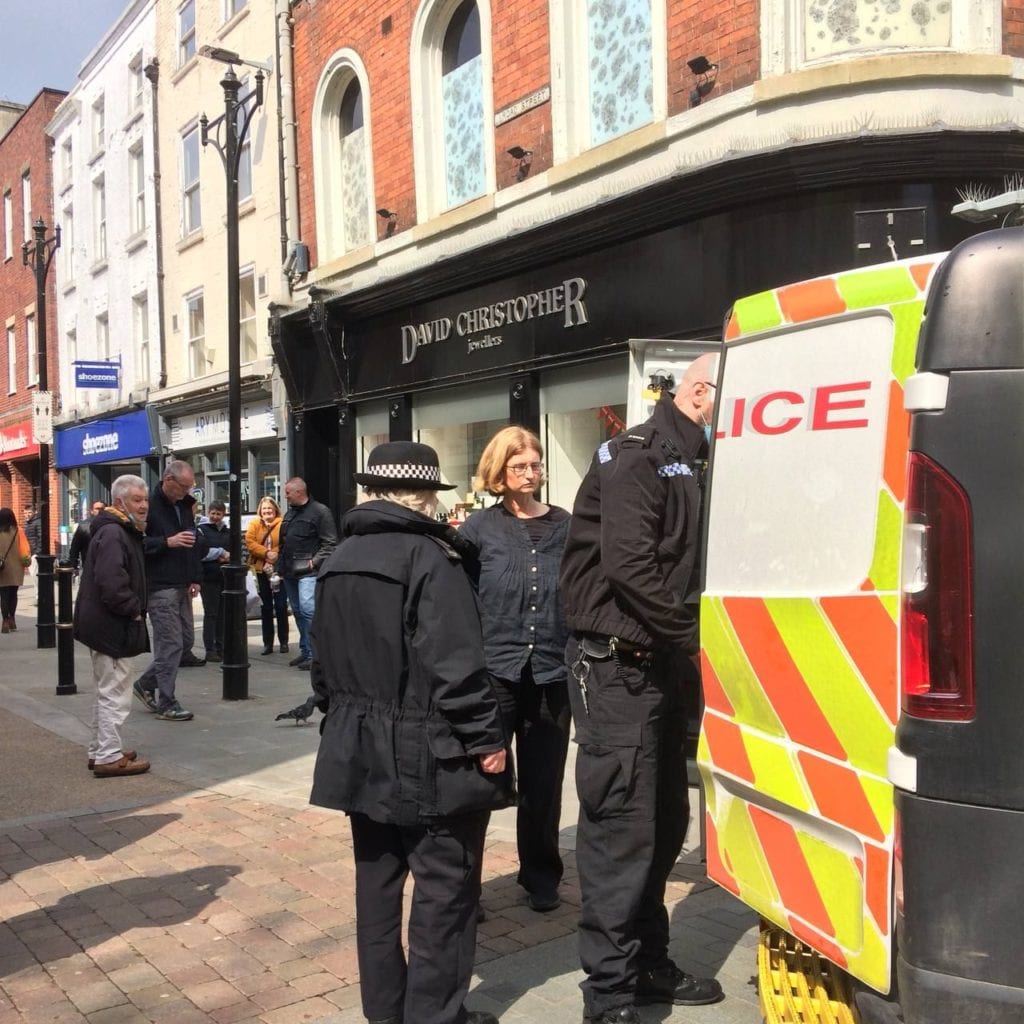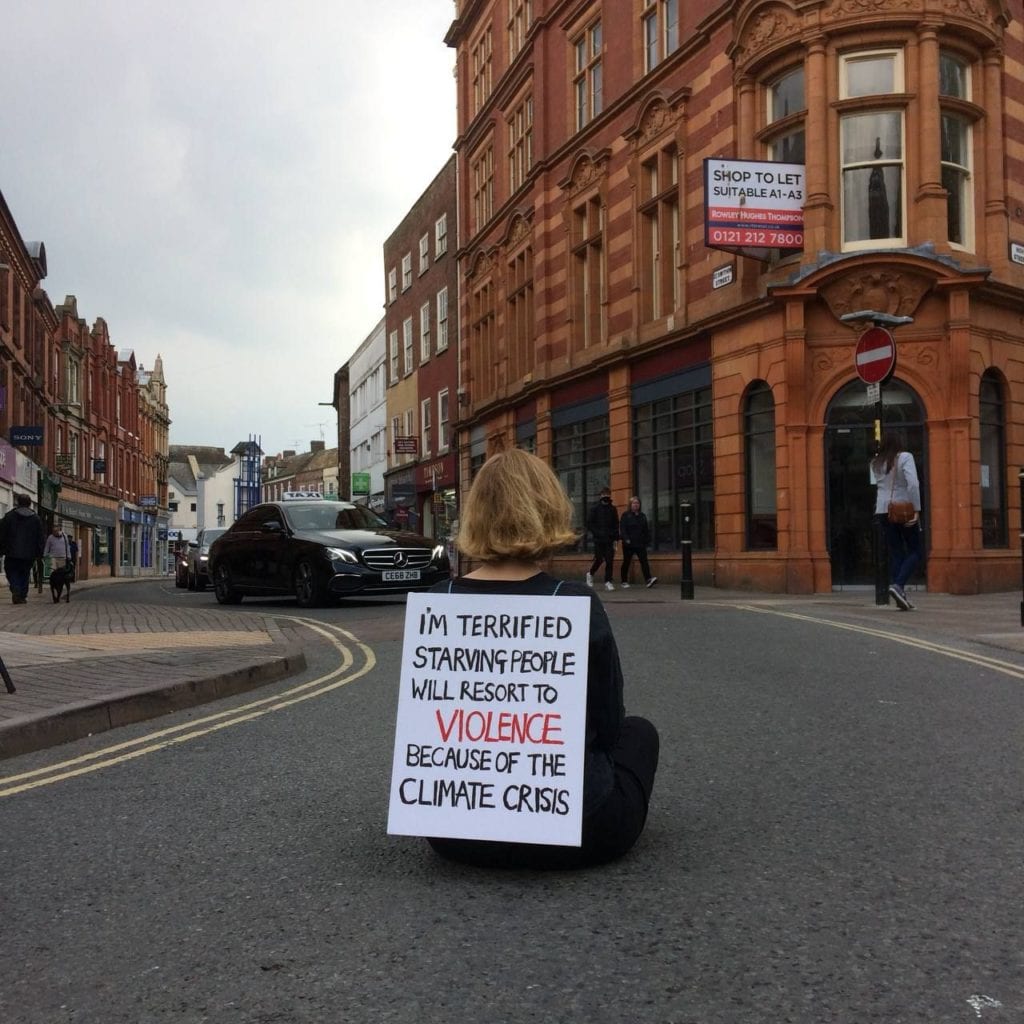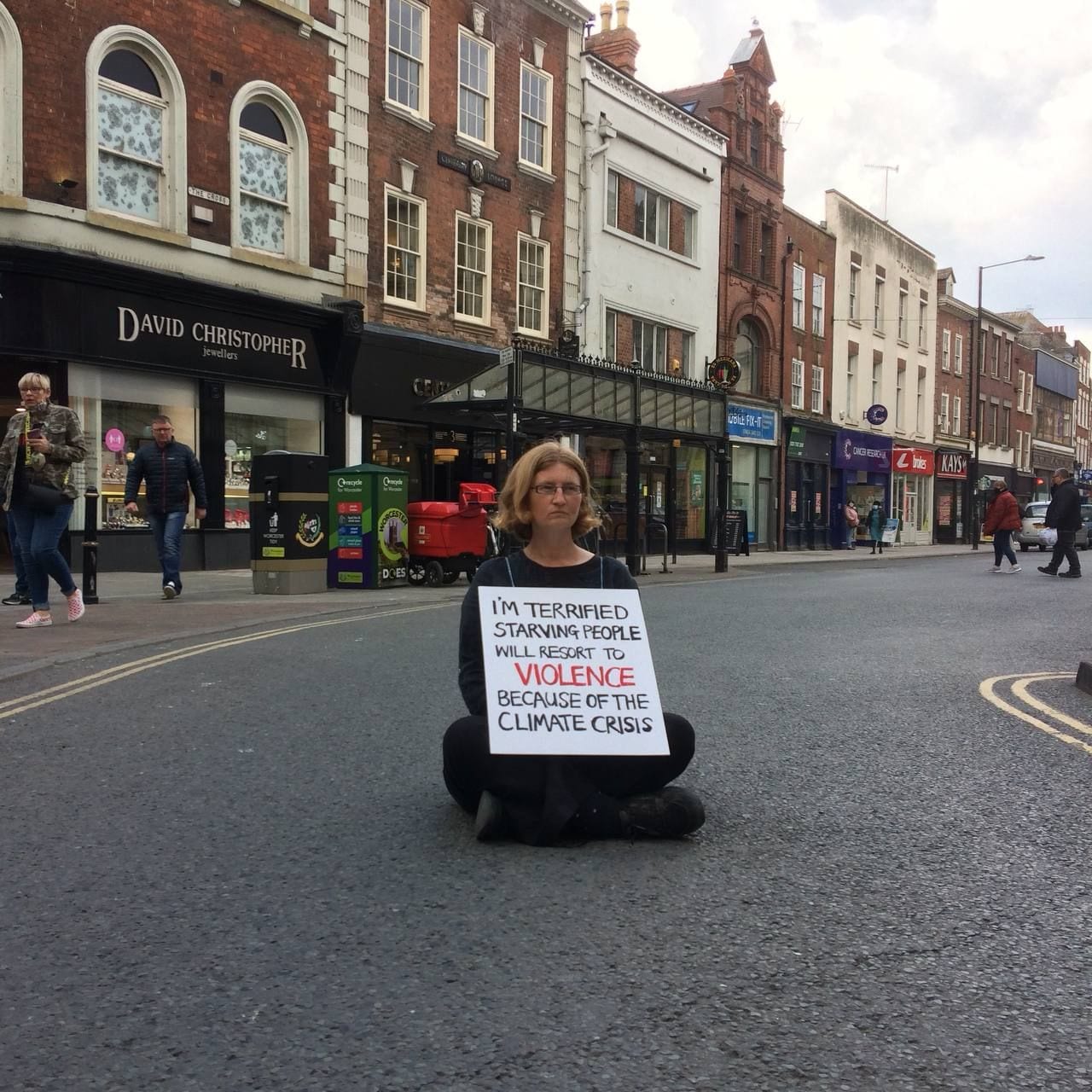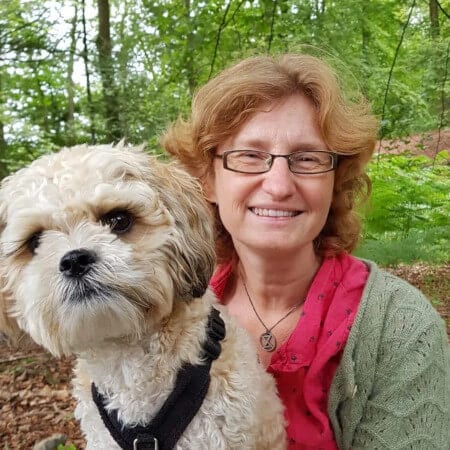I did something over the weekend that I had felt frightened about for months: I walked into a road in my local city, held up my hand to stop the traffic, and sat down. On my chest and back I wore two boards that I’d painted in big letters: “I’m terrified starving people will resort to violence because of the climate crisis.” I held myself still and seated in a cross-legged position and waited.
This act was a part of a national action organized by Extinction Rebellion across the UK. More than 200 people were stepping into roads in their local towns and cities, just as I was doing, at 11 o’clock on Saturday, and all carried their own versions of the sign I was wearing. One young woman said: “I’m terrified of becoming a mother because of the climate crisis.” A man on London Bridge said: “I’m terrified billions will die because of the climate crisis.” My friend said: “I’m terrified my nieces will know only horror and death because of the climate crisis.”
I felt afraid of breaking social norms. The pressure of these norms is stronger than we realise; imagine bursting into a vigorous song and dance in a long supermarket queue and you’ll see what I mean!
The concept behind the action is that the public would witness the bravery and vulnerability of a single person stopping traffic and wonder why they would be motivated to take such a drastic step. As most actions are, it was controversial. Some said it wasn’t clearly directing attention toward the institutions that are responsible for the mess we’re in—governments, banks, oil corporations. Some people said that blocking roads had been “done,” and that disrupting the public again would only make Extinction Rebellion even less popular.
Despite these criticisms, I still felt called to take part in the action. When I tune in to what the Buddha wants me to do, these kinds of decision are often simple; it is almost as if they are made for me. I also want to acknowledge the privilege that made this decision possible at all. I live in a country where people aren’t injured or killed as a result of their activism. I’m a middle-class white woman and I tend to be treated very well by the police. I won’t lose my job or face deportation when I am arrested. Engaging in civil disobedience is something that happens to be possible for me, and so it feels right that it’s my particular offering to the Earth.

In the weeks leading up to the action we pulled together “secret support teams,” who would be present to support the sitters on the day, visibly filming to discourage violence from members of the public, and de-escalating the worst of the abuse by engaging people in conversation. I did my own mental preparation, which meant helping all the different parts of me to get used to the idea of what I would do, and listening to their concerns in turn. Whenever my thoughts turned to the action, my heart would suddenly start banging and I lay awake in the night a few times, seized by fear. There were different worries: how would it feel to be shouted at? What if someone tries to hurt me or drag me away? What if a car runs into me?
I also felt afraid of breaking social norms. The pressure of these norms is stronger than we realise; imagine bursting into a vigorous song and dance in a long supermarket queue and you’ll see what I mean! How would it feel to stop that first car? How would it feel to have all those eyes on me, judging me? I also struggled with causing inconvenience to people I didn’t know. I’d move if an ambulance came, of course, but how would it feel to stop people from reaching a hospital appointment? A job interview? Who was I to make that decision?
My favourite message was from a Worcester woman who’d walked past me with her daughter and happened upon my post on Facebook. She had heard about all the abuse and she wrote to tell me that there were other voices, including hers, who were supporting me, but that they were quieter.
I kept rehearsing in my mind and reminding myself of what I was doing—making an offering to the Earth. I was offering her my vulnerability, my body, in the hope that others would notice my grief and see the Earth’s suffering themselves. Although there were some butterflies in my stomach on the day, as I traveled in by train, I felt mostly calm. I walked up and down the streets of Worcester, browsing in a charity shop to occupy my mind for a while, and then it was time. I chose a car to stop, held up my hand, and sat down in the road.
I know how to sit quietly and calmly in public. I’ve been holding a daily vigil in my home town for more than six months now. Almost immediately a young man began to mock me, incredulous and delighted to be witnessing this weirdo do something so idiotic. Others soon joined him. The first car’s driver lost his temper then mounted the curb to drive around me, hissing “dumb bitch” with an intense hatred as he passed. After a few more cars drove around me, one coming within a centimeter of my legs, there was a break in the traffic and the next driver stopped. I was so grateful to him.

A policewoman was there within 10 minutes and I could tell immediately that she was not happy. She arrested me almost immediately. I told her that I wouldn’t move from the road, and that she’d need to wait for her colleagues before she moved me. At that point I was actually concerned that she would hurt herself if she tried to move me alone. She responded by grabbing my shoulder and dragging me off the road by my arms. I felt shock as she did so. I had never seen a police officer move someone on their own before. The string from my signs cut into my throat. Once on the side of the road I rearranged myself into a cross-legged position again, my signs back in place, and waited with her for the police van to take me to the station. It was over and the relief was enormous. I was home with my husband and my dogs within a couple of hours, despite my expectation of being held until the middle of the night. I had no injuries, I was home safely, and I had done it!
Was the action a success? More than 3,000 people on Twitter watched the video of me being dragged away, and it was also included at the top of an article in the Independent newspaper. My Facebook post was liked more than 400 times and I had messages from friends I hadn’t heard from in years saying they were moved to tears as they watched, or that they wanted to stand next to me if I did it again. My favourite message was from a Worcester woman who’d walked past me with her daughter and happened upon my post on Facebook. She had heard about all the abuse and she wanted to write and tell me that there were other voices, including hers, who were supporting me, but that they were quieter.
As I say to colleagues when they are despairing, it was another drop in the bucket. Who knows when the bucket will fill up and tip. All we can do is take the actions we feel are right, reflect on their effects, learn what there is to be learned, and keep going.
Across the UK, there was a limited amount of national press coverage, but many articles in local newspapers, along with the effect on passersby and through all the sitters’ social media, friends, and families. As with most actions, though, it’s hard to really know how effective it was. Did we make people think? A few, yes. Will this lead to them taking action of their own or changing their votes in local elections? Maybe, maybe not. As I say to colleagues when they are despairing, it was another drop in the bucket. Who knows when the bucket will fill up and tip. All we can do is take the actions we feel are right, reflect on their effects, learn what there is to be learned, and keep going.
As I sat cross-legged on the road, the Buddha was with me. I was inspired by his courage as he left his life of comfort and convention to pursue a more important calling. My history of practice has helped me to hold steady in the face of chaos and my own fear. When I looked through the eyes of the Buddha at those who were shouting and jeering, I could see that they were also suffering. I feel privileged to have taken part in the Rebellion of One, to have supported by my wonderful team, accompanied by so many others. Many of us are offering our drops of love to the Earth, all of them different. Whether or not the bucket tips, it has made me very happy to give this gift.
This article was originally published on Buddhistdoor Global as Doing Something Frightening. It is reprinted here with permission.







